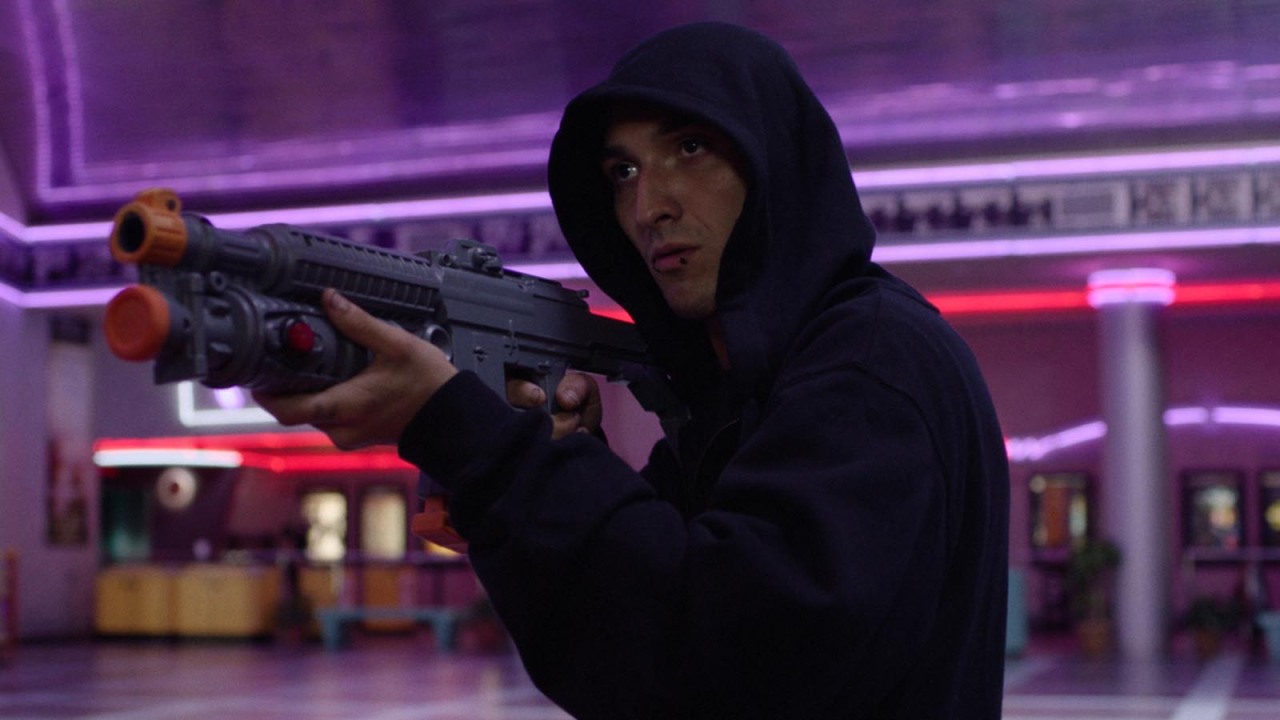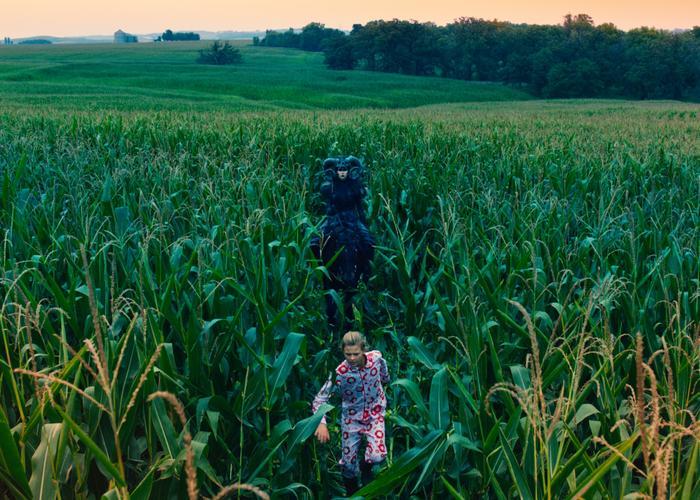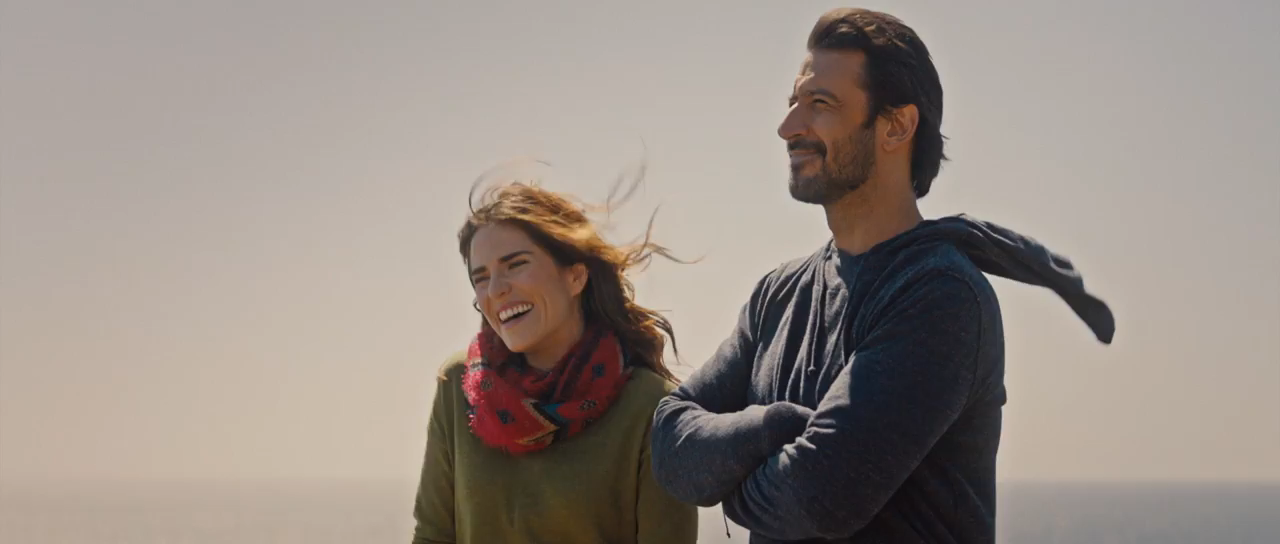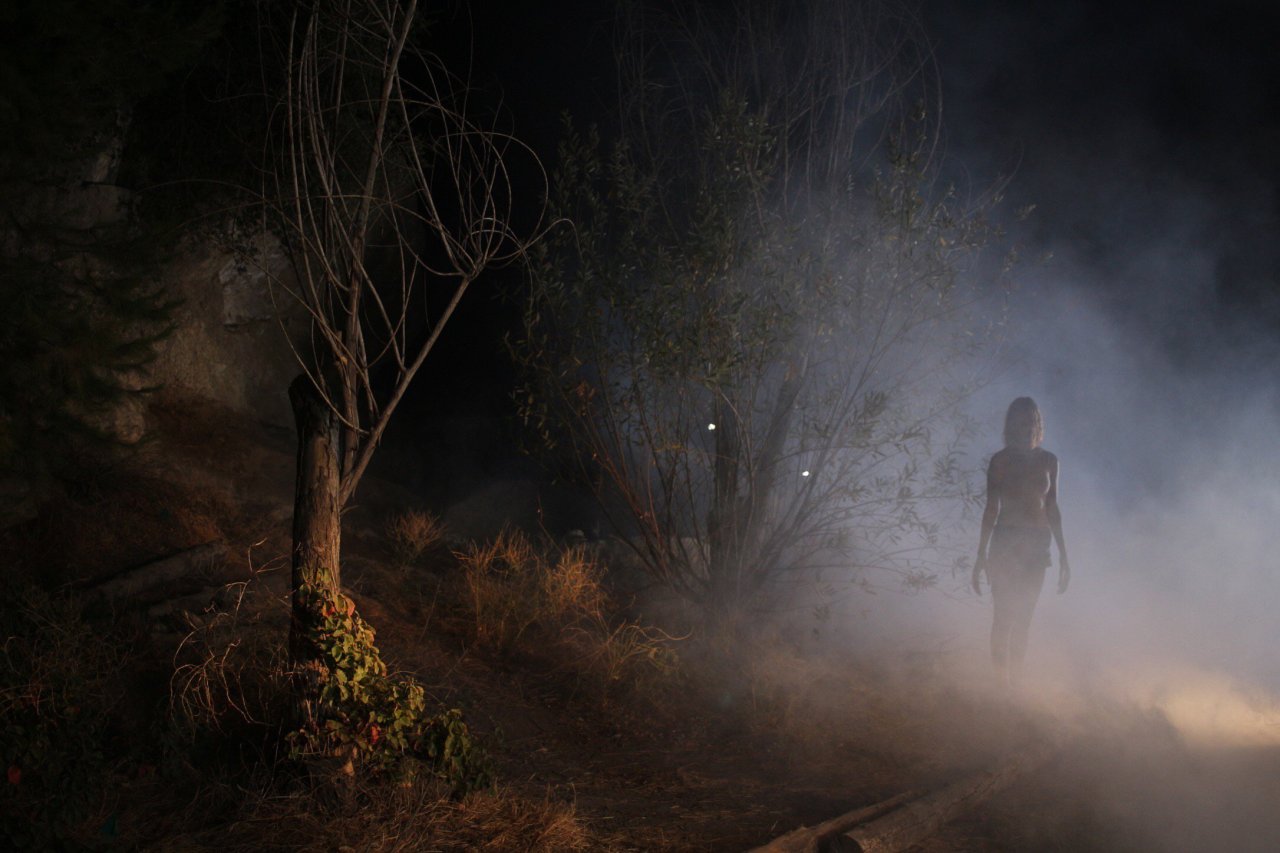
Director Amma Asante with cast and crew on the set of A United Kingdom, 2016.
Here are fifteen new movies due to be released in theaters or via other viewing platforms this February, all of which have been directed and/or photographed by women. These titles are sure to intrigue cinephiles and also provoke meaningful discussions on the film world, as well as the world in general.

FEBRUARY 1: The Lure (dir. Agnieszka Smoczynska) – Consequence of Sound post by Dominick Suzanne-Mayer: “Last year’s Sundance Film Festival offered a wealth of quality films, but of those that left a lasting impression, few were as bold as The Lure, Agnieszka Smoczynska’s striking feature-length debut about a pair of bloodthirsty mermaids who find indulgence and tragedy in modern-day Poland. Oh, and it’s also a musical. More of a new wave rock opera, really.
“The premise alone should be enough to get your attention, but Smoczynska’s film offers far more than just a gimmick; rather, as we discovered at Sundance (one of a legion of festivals the film hit last year), ‘The Lure somehow manages to seamlessly assemble a film equal parts hilarious, affecting, and grisly while trading and warping aesthetics and tones by the scene.’ It’s a wild piece of filmmaking, and the perfect antidote for the jaded moviegoer who thinks they’ve seen it all. Trust us, you haven’t seen anything quite like this before, and the film’s first trailer gives a pretty good taste of what audiences can expect, while holding back on some of the best stuff.
“The Lure will debut at New York’s IFC Center on February 1st, and will hopefully appear elsewhere as the year goes on. In the meantime, a bit more about the film: ‘In this bold, genre-defying horror-musical mashup — the playful and confident debut of Polish director Agnieszka Smoczynska — a pair of carnivorous mermaid sisters are drawn ashore in an alternate ’80s Poland to explore the wonders and temptations of life on land. Their tantalizing siren songs and otherworldly aura make them overnight sensations as nightclub singers in the half-glam, half-decrepit fantasy world of Smoczynska’s imagining. In a visceral twist on Hans Christian Andersen’s original Little Mermaid tale, one sister falls for a human, and as the bonds of sisterhood are tested, the lines between love and survival get blurred. A savage coming-of-age fairytale with a catchy new-wave soundtrack, lavishly grimy sets, and outrageous musical numbers, The Lure explores its themes of sexuality, exploitation, and the compromises of adulthood with energy and originality.'”

FEBRUARY 3: Dark Night (dir. Tim Sutton) (DP: Hélène Louvart) – Excerpts from Collider review by Chris Cabin: “It’s understandable and yet slightly misleading that there has been a direct connection between the Aurora massacre of 2013 and Dark Night, Tim Sutton‘s new film about a Florida community where one resident is planning a similar attack. Footage of the trial of James Holmes, the young man who shot 10 people dead in Aurora while they watched The Dark Knight Rises, is seen within 10 minutes of the film’s opening and is discussed, fleetingly, by those watching it. Images of a young man coloring his buzzed hair the same tint of fiery orange and red as Holmes show up throughout the film, as the man skateboards and hangs out with friends. The final, devastating shot features a gunman sneaking into a theater through the back door, just as Holmes did.
“These fragmented nods and allusions toward what happened in Aurora are unmistakable for those who followed the case but Dark Night, smartly and thankfully, doesn’t attempt to recreate the events leading up to Holmes’ massacring of innocents. One would be hard-pressed to simply explain Dark Night‘s narrative progression as there isn’t an easy way to describe the narrative itself. Sutton, the director behind 2014’s exquisite Memphis, offers what amounts to an abstraction of everyday life in the unnamed Florida neighborhood, which could essentially double for any sunny place in the United States. A woman exercises and takes a selfie with her morning smoothie; a pair of teens stay glued to their glowing cellphones; a veteran watches his nurse wife walk out on him for good; a boy plays with his pet snake, alone in his bedroom. Elsewhere, one young man imagines walking into a fury of photographers and journalists asking for his motives, and another trudges through his neighborhood with an assault rifle.
“Dark Night is not particularly interested in conveying the horror of Aurora or any similar event, though Sutton works up a consistent sense of dread that consistently infiltrates his images and the impressionistic flow of the editing. Rather, Sutton’s film at once questions and embraces the idea of symbolic acts and images. The young man who walks into a cadre of reporters and angry protestors could be imagining that encounter, but he could also be remembering it. Is one to assume the clearly frustrated and angry veteran may be a shooter because of his training? There’s at least one scene where we see his proficiency at taking apart and cleaning his gun but Sutton’s depiction of this exercise is more similar to a mechanic taking apart part of an engine than anything malevolent. This is less true of the man with the assault rifle.
“…The first image of the film is of a young woman’s eyes roaming around as sequenced colored light bounces off her face. It might take you a few seconds before you realize that she’s not watching a screen but cop cars, ambulances, and fire engines in the parking lot outside the theater. Other moments – kids swimming in pools, a college student getting an academic warning behind closed doors, etc. – similarly feel plain but Sutton’s sobriety doesn’t hull out the film’s powerful emotional core. His eye for detail and modernity, such as when he fills the screen with an online street-view app, is sober and exacting but he also finds potent moments of fury and caring. In fact, Sutton consistently returns to an interview he’s doing with the young man who imagined the reporters.
“In fact, Sutton consistently returns to an interview he’s doing with the young man who imagined the reporters and his mother, who has nothing but loving and supporting things to say about her son; he also has a best friend who he talks to nonstop while they play online video games. The director is asking us to look as much at what makes people get along in life as the visual indicators of a violent act, to see the elements that support this admittedly docile, boring, and often superficial existence and cultivate the more heartening and genuinely good moments in your life.
“Even as the filmmaker heads towards yet another terrifying assault, Dark Night is as much about gloom as it is astonishment, to see the power of an act or an image to either turn someone into a killer or to inspire them toward empathy. Aside from his interview with the young man and his mother, Sutton only comes out from behind the camera one more time, to speak with the gunman about his movie-star look. One is left wondering if he’s speaking about the fame that this movie might bring him or the all-too-familiar infamy that comes with national tragedies.”

FEBRUARY 3: This Is Everything: Gigi Gorgeous (dir. Barbara Kopple) – RogerEbert.com review by Matt Fagerholm: “They stare directly at you and invite you to be a part of their conversation. They reveal intimate details about their lives in order to normalize what certain parts of society still consider taboo. They tell us that we needn’t be anything other than ourselves, and how can we resist liking them for that? That is the power a person has when they post a video on YouTube. The bond that viewers forge with an Internet celebrity is stronger than has ever been achieved in any other medium. For people who have trouble relating to others, watching these video confessionals can serve as a half-step toward human connection. We’ve already entered the age of Fahrenheit 451, where “friends” primarily exist on screens that take up the majority of our attention. Yet the best YouTubers are the ones who encourage their viewers to turn their attention inward and engage with the world existing outside of their laptops. When Alexis G. Zall comes out by saying she “likes girls,” or when Brad Jones opens up about surviving a suicide attempt, they aren’t just providing a diversion, they are changing lives through the empowerment of truth.
“This Is Everything: Gigi Gorgeous, the latest work from master documentarian Barbara Kopple (available on YouTube Red starting February 8th), focuses on the truth of one particular YouTuber whose sense of self is only strengthened online. Born Gregory Lazzarato in 1994, he excelled at diving throughout his childhood, winning a national championship at age 15. Yet in home video footage of the young boy, his face has the sort of uneasy expression any viewer of TLC’s ‘I Am Jazz’ will immediately recognize. There’s no question he feels uncomfortable in his skin, and is much more interested in filming makeup tutorials than he is with stereotypical male activities. The videos he posts as ‘Gregory Gorgeous’ gain a greater following once he identifies himself as gay, and at 100,000 subscribers, his channel attracts the attention of manager Scott Fisher, who understands the profitability of vloggers. Fisher explains to Kopple how sites like YouTube have enabled talent to maintain unprecedented control over their content, while earning the lion’s share of the revenue, something that could’ve never happened a mere handful of years ago.
“In many ways, this film is a fitting follow-up to Kopple’s Miss Sharon Jones!, a rousing portrait of the titular soul singer who passed away last year. Just as Jones triumphantly forged ahead in her life and career in the aftermath of her cancer diagnosis, earning a Grammy nomination in the process, Gregory comes to a pivotal realization after his loving mother succumbs to cancer in 2012. Faced with the fragility of life and the limited time afforded to each of us on Earth, the young man decides to finally act on his inner-most desire, and that is to live the rest of his life as a woman. The ‘he’ of her past is officially no more. Though her brothers are entirely in support of her transition, the news is more difficult for her father, David, to accept. In an emotional interview with Kopple, he affirms that it is a father’s duty to love his children even if he doesn’t understand them. Renaming herself as Gigi Lazzarato, she smuggles her camera into a visit with her dad, where she tells him of her plans to undergo facial feminization surgery, a procedure that will cost $14,000. When he asks her if she has that kind of money, Gigi informs him that she’s already paid for it. Though David still occasionally uses male pronouns while addressing Gigi, there is no doubt in his mind that his child knows exactly what she wants. He accompanies her to appointments with the physician, and later with the Beverly Hills doctor that will give her breast implants. In a lingering shot, the camera regards from a wide angle the tender image of David gently tucking his daughter into bed in their hotel room as she recovers from her latest surgery.
“It is in observant, delicately nuanced moments like these where Kopple’s genius shines the brightest. She has crafted so many unforgettable films about inspirational life forces, from the courageous wives of coal miners in Harlan County, U.S.A. to the politically outspoken Dixie Chicks in Shut Up & Sing, and this is one of her best. Gigi’s exuberant presence makes the picture a complete joy from beginning to end, as Kopple seamlessly weaves her own documentation of her subject’s journey with footage from Gigi’s videos, where she guides viewers along every step of her external transformation. There’s an especially intriguing video that depicts Gigi having a conversation with her male persona, and her macho posturing comes off as all the more artificial when directly contrasted with her feminine self. Fisher notes that whereas Gregory yearned to stand out from the crowd, Gigi’s goal is to blend in, finding acceptance from others on her own terms. Yet aside from the testosterone blockers and estrogen, Gigi believes that the transition undergone by a transgender person is more mental than anything else, and doesn’t necessarily require a change of genitalia. As Gigi sits in a car, calm and confident in her body, Kopple brilliantly juxtaposes her footage with the voice of Gregory, encouraging his viewers to be themselves. This one scene conveys the unchanging nature of identity regardless of one’s physical state with more clarity and impact than the entirety of Cloud Atlas. Though the film culminates with Gigi’s participation in New York Fashion Week, where she struts the runway looking like Lady Liberty, an even more satisfying highpoint occurs at David’s wedding to his second wife. It’s the first time much of Gigi’s extended family has seen her post-operation, and when she walks down the aisle, her elation radiates through the screen.
“One of the questions raised by Kopple’s film is whether Gigi will choose to take the advice of her new manager and alter her image in order to attract more sponsors. I doubt it. While actors in Hollywood often have to compromise their own identities in order to be more commercially viable, YouTubers like Gigi make a fortune by being true to themselves. She embodies the wisdom of a young generation infinitely more accepting of gender fluidity than their predecessors. There’s a chilling resonance to the moment where Gigi reflects on the legacy of German physician Magnus Hirschfeld, and the Nazis that attempted to silence his groundbreaking advocacy for gay and transgender rights. If current events have proven anything, it’s that the threat of such intolerance remains frighteningly real. Yet sometimes, all one has to do is look a person in the eye in order to change their heart. That is how a revolution begins.”

FEBRUARY 7: Almost Adults (dir. Sarah Rotella) [available on iTunes] – Synopsis from the film’s official website: “This comedy feature follows two best friends in their final year of college while they transition into adulthood. One embraces her sexuality and tries to catch up on everything she has missed during her teenage years, while the other ends a long term relationship with her boyfriend and discovers her life isn’t going as planned. Both struggle to keep their friendship together as they begin growing apart.”

FEBRUARY 10 [delayed from previous January release date]: Kedi (dir. Ceyda Torun) – Synopsis from the film’s official website: “Hundreds of thousands of Turkish cats roam the metropolis of Istanbul freely. For thousands of years they’ve wandered in and out of people’s lives, becoming an essential part of the communities that make the city so rich. Claiming no owners, the cats of Istanbul live between two worlds, neither wild nor tame — and they bring joy and purpose to those people they choose to adopt. In Istanbul, cats are the mirrors to the people, allowing them to reflect on their lives in ways nothing else could.
“Critics and internet cats agree — this cat documentary will charm its way into your heart and home as you fall in love with the cats in Istanbul.”

FEBRUARY 10: Land of Mine [Current Oscar Nominee: Best Foreign Language Film] (dir. Martin Zandvliet) (DP: Camilla Hjelm Knudsen) – Excerpts from Screen Daily review by David D’Arcy: “Denmark’s mistreatment of German prisoners after World War II, a little-known chapter of post-war history, is a powerful j’accuse in Land of Mine, which may surprise all but specialised historians. The film revisits the Allies’ practice of using captured Germans to clear land mines on the Danish coast that would blow many of them to bits. There’s also humanity here in the bond that forms between a stern Danish sergeant (Roland Moller) and the adolescent POWs in his charge.
“…At war’s end, some 1.5 million mines placed by the Nazis remained on Denmark’s west coast. Defusing them was a national urgency. Rather than use Danes who had sacrificed so much during the Nazi occupation, British liberators proposed that the Danish government deploy thousands of Wehrmacht POWs on Danish territory for the job. At least half of them died at that task from May to October 1945.
“Land of Mine isn’t the first account that suggests that the Danes committed a war crime. Nor is it the first examination of brutality against defeated Germans in 1945. What’s new is that those charges of Danish misdeeds are being brought to a wide audience in the language of epic cinema. Zandvliet (A Funny Man, 2011, Applause, 2009) picks up the story as a vengeful Danish officer assigns a stern sergeant (Moller) to manage a brigade of boy prisoners conscripted late in the war. Moller’s ox-like character makes that severity look a lot like sadism, until the cruelty of his British and Danish superiors and the deadliness of the job draw out his protective instincts.
“…The tension builds on the impressive composure of German and Swiss teenage actors (many of them already television veterans), including the endearing twins Emil and Oskar Belton – still not yet 16 – who play brothers who are captured in Germany’s dying days. With some adroit promotion, the young cast could be a strong selling point in German-speaking countries and beyond.
“The sand dunes of Denmark’s Skallingen peninsula (finally declared mine-free in 2012) are a huge canvas for cinematographer Camilla Hjelm Knudsen, the director’s wife, who evokes a desert-like vastness reminiscent of a David Lean landscape for boys forced into a labour of futility. The motif of teenagers marching into those expanses drives home the grim truth that wars don’t end when the belligerent commanders declare the fighting to be over.”

FEBRUARY 10: One Night (dir. Minhal Baig) – The Austin Chronicle’s Austin Film Fest review by Sarah Marloff: “Dabbling in magical realism, Minhal Baig’s One Night toys with the theme of traveling back in time. The idea that the past is simultaneously more simple and more magical is both questioned and contemplated throughout the film, which follows two couples over the course of prom night.
“Within the walls of a Los Angeles hotel, the debut feature from writer/director Baig weaves a compelling story and honest look at love and relationships – from falling in to falling apart. High school seniors Bea (Isabelle Fuhrman) and Andy (Kyle Allen) are accidentally thrown together when their prom ends and the afterparty begins. Elizabeth (Anna Camp of Pitch Perfect) and Drew (Justin Chatwin), on the other hand, are young adults who seem to have mistakenly chosen the hotel hosting that same prom to rehash (or repair?) their failing marriage.
“The juxtaposition of watching two people becoming a couple – the enchantment of being 17 and completely awed by another human – with the cold realities of a struggling long-term relationship offers viewers a glimpse at relationship reality. Hollywood is forever obsessed with the happily ever after ending, but life and love are far too complex to allow for a simple skipping off into the sunset – or sunrise – as the case may be. One Night doesn’t hold back from this. Relationships are hard work and sometimes love simply cannot overcome the mundane difficulties of life.
“Though very beautifully weaved, at times the film’s dialogue seems unsure of itself, specifically between Elizabeth and Drew. Are they actors acting like they’re acting or are they two adults trying to play make believe? At first it’s hard to tell, perhaps because Baig wasn’t entirely sure either. But as the story unravels, the actors and the script find their footing. Bea and Andy, however, never falter in convincing the audience of their 17-year-old, smart-ass naivete. Together they manage to steal the show and infuse the film with hope. In the warm light of day, One Night is an endearing look at what makes and what keeps a relationship alive.”

FEBRUARY 10: Sex Doll (dir. Sylvie Verheyde) – IFC Films synopsis: “A high-priced call girl navigates the shadowy world of London’s sex trade underground in this provocative, erotic thriller. Virginie (César Award winner Hafsia Herzi) goes about her work as a prostitute with a cool detachment, trading sex with wealthy businessmen for money, but never getting emotionally involved. That all changes when she meets Rupert (Ash Stymest), an enigmatic stranger with unclear intentions. Risking everything, Virginie plunges into a dangerous affair that tears her between a ruthless madame who forbids romantic attachments and a dark, sexy man who could be her savior or her downfall.”

FEBRUARY 10: Speed Sisters (dir./DP: Amber Fares) – Cinema Village synopsis: “The Speed Sisters are the first all-woman race car driving team in the Middle East. Grabbing headlines and turning heads at improvised tracks across the West Bank, these five women have sped their way into the heart of the gritty, male-dominated Palestinian street car-racing scene. Weaving together their lives on and off the track, Speed Sisters takes you on a surprising journey into the drive to go further and faster than anyone thought you could.”

FEBRUARY 10: A United Kingdom (dir. Amma Asante) – Excerpts from The Guardian review by Mark Kermode: “…Eye in the Sky screenwriter Guy Hibbert’s screenplay (from Susan Williams’s 2006 book Colour Bar) revisits an often forgotten chapter of postwar history that might be filed under ‘stranger than fiction.’ Rosamund Pike is Ruth Williams, a clerk from Blackheath, south London, working in Lloyds of London in 1947, who is swept off her feet by handsome law student Seretse Khama (Oyelowo). Ruth doesn’t know that Seretse is an African king in waiting, leader-to-be of the Bamangwato people of Bechuanaland (later Botswana), the British protectorate to which he is due to return on completion of his studies.
“When Seretse proposes, having duly explained his true identity, Ruth imagines a new life away from the misty drizzle of London, a life that, she assures her fiance, will be taken ‘moment by moment – together.’ But when the news of this high-profile black-and-white union reaches neighbouring South Africa, whose National party is busy enshrining apartheid in law, the cash-strapped British authorities move first to forbid and then to undermine the marriage, scared of alienating their supplier of cheap gold and uranium. Seretse’s regent uncle, Tshekedi Khama (Vusi Kunene), also refuses to countenance a white queen and a rift develops that threatens to tear apart more than just love.
“Handsomely shot on locations in the UK and Botswana by Sam McCurdy, A United Kingdom contrasts sweeping exteriors with fusty interiors, breathing rich visual life into the battle between an entrenched establishment and an emerging republic. Production designer Simon Bowles and composer Patrick Doyle clearly relish the broad canvas opportunities of the narrative, while Asante cites Richard Attenborough and David Lean as her guiding lights.
“For all the film’s vibrant grandeur, though, our attention is kept tightly focused on the central couple’s romance, even when they are separated by geography, economics and politics. Much is made of the world-turned-upside-down absurdity of Labour prime minister Clement Attlee’s obsequious loyalty to South Africa while the Conservative Churchill appears to be an ally of Khama’s progressive cause (although pragmatism soon overrides opposition promises), but it’s the wholly believable and tangible bond between Oyelowo’s Seretse and Pike’s Ruth that delivers the real emotional punch.
“…’I want to make pieces of entertainment and art that mean something,’ Asante recently told the BBC while musing upon her forthcoming film, Where Hands Touch, a longstanding passion project about a relationship between a bi-racial girl and a Hitler Youth boy in 1930s Berlin. ‘I want to make movies that leave some kind of mark on you.’ With A United Kingdom she has done just that.”

FEBRUARY 17: American Fable (dir. Anne Hamilton) – Variety’s SXSW review by Andrew Barker: “If imitation is indeed the sincerest form of flattery, then writer-director Anne Hamilton’s American Fable registers as an eloquently constructed valentine to Guillermo del Toro, whose Pan’s Labyrinth provides her film with its haunting backbone. Gorgeously shot, and helmed with a sense of daring and verve that belies Hamilton’s greenness to feature filmmaking, this is a debut of obvious promise, although its story never quite rises to the level of its craft. Premiering in the experimental Visions program at SXSW, this tale of farmland intrigue as seen through the eyes of a dreamy 11-year-old has just as much arthouse potential as many of the supposedly more commercial entries in the narrative competition, though it may ultimately function best as a passport to bigger things for its gifted young director.
“Hamilton’s introduction to filmmaking came via an internship with Terrence Malick on the set of The Tree of Life, and the director’s tendrils are visible from the very first shot, a dramatically swooning overhead view of a young girl chasing a chicken through monstrous expanses of corn stalks. The girl is Gitty (Peyton Kennedy, excellent), an imaginative, friendless grade schooler growing up in the farmlands of Wisconsin. The year is 1982, and overheard Ronald Reagan speeches place us right in at the beginning of the farm crisis, its gravity underscored by passing mentions of the rash of suicides in town.
“Gitty adores her father, the salty Abe (Kip Pardue), who does everything he can to distract her from the fact that they’re in dire danger of losing their farm. Her factory-worker mother (Marci Miller) is pregnant with a third child, and Gitty’s older brother, Martin (Gavin MacIntosh), is a study in unhinged, unmodulated malevolence.
“Wandering the farmlands on her bike, she makes a startling discovery: Locked inside her family’s unused silo is a dirty yet expensively dressed man calling himself Jonathan (Richard Schiff) who claims to have gone days without food. Though he’s short on details, Jonathan is a developer who’s been buying up farms in the area, and it doesn’t take long for Gilly to intuit that her own family has played some part in this kidnapping. As she begins bringing him food and books, the two develop a bond, with Gitty rappelling down through a small hole in the silo roof for chess lessons and reading sessions.
“Meanwhile, Gitty’s father conducts some mysterious business with a Mephistophelean woman named Vera (Zuleikha Robinson), and Gitty begins to experience visions of a black-clad, horned woman striding through the countryside on horseback. These hesitant forays into the mythological realm — reaching a feverish peak with a flashy dream sequence — feel oddly underdeveloped, alternating between inscrutable and needlessly obvious, with a long montage accompanying a recitation of Yeats’ ‘The Second Coming’ a prime example of the latter.
“One of the strongest cues Hamilton takes from Pan’s Labyrinth, however, is the decision to allow Gitty’s own loyalties and misunderstandings to dictate the film’s p.o.v., and Kennedy ably carries the film on her back, radiating self-confidence while retaining an essential naivete and vulnerability; her many scenes of peering through doorways at conversations she doesn’t quite understand are beautifully played. Yet even accounting for this, the intrigue at the film’s center never makes total sense, and Gitty’s ultimate ethical dilemma — whether to leave Jonathan to his fate or put her own family at risk — never arrives with the right urgency. The shoehorned introduction of a few too many extraneous elements, especially a Marge Gunderson-esque retired police officer (Rusty Schwimmer), doesn’t help.
“Working with d.p. Wyatt Garfield, Hamilton shoots the rural landscape with a transformative eye. These farmlands aren’t dusty expanses but rather humid, almost primordial jungles; individual frames from nighttime scenes in the family barn could easily be oil paintings of the Nativity. More than just cataloguing pretty shots, Hamilton builds an arresting aura of wonder and terror, of which Gingger Shankar’s haunting, teasing score is very much a piece.”

FEBRUARY 17: Everybody Loves Somebody (dir. Catalina Aguilar Mastretta) – The Hollywood Reporter’s Palm Springs International Film Festival review by Stephen Farber: “One of the crowd-pleasing world premiere films shown this year in Palm Springs is a bilingual romantic comedy, Everybody Loves Somebody, which doesn’t break any new ground thematically but still manages to make an appealing addition to the rom-com genre. Pantelion Films will release it in the U.S. and should find a sympathetic audience, especially if the picture is shrewdly marketed in parts of the country with sizable Latino populations.
“Clara (Karla Souza) is a successful doctor in Los Angeles but not so successful in her love life. All her dissatisfactions come to the surface when her parents, who live in Baja, decide to get married after 40 years of cohabiting without a license. Writer-director Catalina Aguilar Mastretta commented after the PSIFF screening that this part of the story was inspired by her own family background. The other details may be less autobiographical. Clara is something of a self-destructive mess, often trying to undermine the relationships of other people in her life, including her own patients. She is prone to one-night stands but seems to have an almost pathological fear of commitment.
“We find out why when she attends the family shindig in Mexico and reconnects with an old flame, Daniel (Jose Maria Yazpik), who apparently broke her heart years ago when he took off on a series of globe-trotting adventures. There is clearly still a spark between the two of them, but Clara is also tentatively exploring a relationship with a resident in her medical office, Asher (Ben O’Toole), an Aussie who seems far more grounded than either Clara or Daniel.
“Anyone expecting an incisive exploration of human psychology or cross-cultural conflicts will find the script pretty superficial and overly reliant on self-help bromides. Yet we get caught up in the movie all the same. Everybody may lack depth, but it often compensates with raucous humor. There’s also the novelty value of seeing a movie in which most of the characters flip easily and gracefully between conversing in Spanish and English. The inviting Baja seaside settings are another enticement.
“But the main reason for the movie’s success is its irresistible cast. Souza manages to make us care about Clara even when she’s behaving atrociously. Her sassy spirit has us rooting for her to escape her downward spiral, but there’s no sentimentality in her portrayal. All the other attractive castmembers bring charm and energy to their performances. Patricia Bernal as Clara’s wacky but loving mother and Tiare Scanda as her more conventional sister both make strong impressions. O’Toole is especially winning as the wise but wounded Aussie. He manages to make a convincing case for stability without ever seeming too good to be true.
“The true test of a winning romantic comedy is whether it makes the audience root for the clinch between the mismatched lovers. Despite its superficiality, the film succeeds in meeting that primary goal of the genre, so it leaves the audience in a cheerful mood.”

FEBRUARY 17: Lovesong (dir. So Yong Kim) (DPs: Guy Godfree and Kat Westergaard) – Variety’s Sundance Film Festival review by Justin Chang: “Conceived in the same delicate minor key as her earlier films (In Between Days, Treeless Mountain and For Ellen), So Yong Kim’s fourth feature dances nervously but gracefully around a love that not only dares not speak its name, but can barely even figure itself out. Anchored by Riley Keough’s lovely, wistful performance as a mom in her 20s who gets back in touch with an old childhood bestie (a sharp Jena Malone), Lovesong makes a virtue of restraint as it traces a complex emotional history in two parts, and innumerable (and sometimes quite literal) shades of gray. The result may not significantly broaden the audience for Kim’s subdued, perceptive work but nevertheless stands as her most accessible feature to date, and deserves a listen from discerning arthouse distributors.
“…What’s left in the end, and it’s significant, is a sudden rush of tenderness that testifies to the depth of feeling that has transpired between Sarah and Mindy, even if they may lack the words or the inclination to define it. While some may dismiss Lovesong as retrograde for not adhering to the happy-ending expectations of a 21st-century queer romance (or a mid-1950s queer romance, on the evidence of Carol), the film is not, in the end, a narrative of the closet … there’s a remarkable truthfulness to the film’s acknowledgment that people often make enormous decisions rooted not in fear so much as uncertainty, even laziness, as well as a comfort with their lives as they’ve lived them until the present juncture.
“Malone, with her knack for playing strong-willed, hard-edged young women, is perfectly cast as the brash, impulsive, needy and inconsiderate friend who has come to rely deeply on Sarah. And Keough makes entirely clear why Sarah invites her friend’s trust: Bearing an uncanny resemblance to Kristen Stewart at her most expressively withdrawn, the actress (soon to be seen on Starz’s ‘The Girlfriend Experience’) projects a soulful integrity that keeps the character from seeming too passive. She may not seem to be doing much at any given moment, but her every silent, darting glance makes clear that she’s both a natural caretaker — of her friend, of her daughter — and also someone with an eye on a potentially new horizon.
“Lensers Kat Westergaard and Guy Godfree keep their gently handheld cameras close to the primary actors but occasionally pull back to take in the cool, calming beauty of their natural surroundings. The soundscape balances occasional soft-rock tunes and a mistily subdued score by the multitalented composer Johann Johansson (Sicario, The Theory of Everything).”

FEBRUARY 17: XX (dirs. Roxanne Benjamin, Karyn Kusama, St. Vincent (Annie Clark) and Jovanka Vuckovic) (DPs: Ian Anderson, Tarin Anderson and Patrick Cady) (animated segments created by Sofia Carrillo) – Excerpts from The Hollywood Reporter’s Sundance Film Festival review by David Rooney: “Following on the heels of recent horror anthologies like Southbound and the V/H/S franchise, XX strings together four shorts written and directed by women, including Karyn Kusama, Roxanne Benjamin, Jovanka Vuckovic and Annie Clark, aka indie rock musician St. Vincent. Beyond the chromosomal title, the twisted take on motherhood shared by three installments, and the macabre wraparound and interstitial sequences by Mexican stop-motion animator Sofia Carrillo, there’s no binding thread here. The package mixes existential creepiness with black comedy, demonic carnage and a Satan’s spawn scenario, and while it’s uneven — as these combos invariably are — genre enthusiasts looking for a female spin will want to check it out.
“Arguably the most startling breakout among women in horror lately has been Australian Jennifer Kent’s wickedly effective The Babadook. Echoes of that film’s terror of maternal failure resurface here, plus there’s a vague kinship between the darker visual flourishes of Kent’s fairy-tale nightmare and Carrillo’s playful segments — dollhouse interludes that suggest a Tim Burton Toy Story. In terms of style and tone, however, the four shorts have little in common.
“…The best thing about this project is that in the genre realm of the final girl, each story features a female protagonist facing unique fears beyond scream-and-die victimhood, in one case becoming the vessel of carnage herself.”

FEBRUARY 24 (LA), MARCH 1 (NYC): Kiki (dir. Sara Jordenö) (DP: Naiti Gámez) – Synopsis from film’s official website: “In New York City, LGBTQ youth-of-color gather out on the Christopher Street Pier, practicing a performance-based artform, Ballroom, which was made famous in the early 1990s by Madonna’s music video ‘Vogue’ and the documentary Paris Is Burning. Twenty-five years after these cultural touchstones, a new and very different generation of LGBTQ youth have formed an artistic activist subculture, named the Kiki Scene.
“Kiki follows seven characters from the Kiki community over the course of four years, using their preparations and spectacular performances at events known as Kiki balls as a framing device while delving into their battles with homelessness, illness and prejudice as well as their gains towards political influence and the conquering of affirming gender-expressions. In Kiki we meet Twiggy Pucci Garçon, the founder and gatekeeper for the Haus of Pucci, Chi Chi, Gia, Chris, Divo, Symba and Zariya. Each of these remarkable young people represents a unique and powerful personal story, illuminating the Kiki scene in particular, as well as queer life in the U.S. for LGBTQ youth-of-color as a whole.
“The spectacular Kiki balls, a consistent component of the Kiki subculture, offer performers a safe and empowered space to enact various modes of gender expression, including a stylized femininity that, if executed in the communities in which they grew up in, could provoke ridicule and violence. Kiki scene-members range in age from young teens to 20’s, and many have been thrown out of their homes by their families or otherwise find themselves on the streets. As LGBTQ people-of-color, they constitute a minority within a minority. An alarming 50% of these young people are HIV positive. The Kiki scene was created within the LGBTQ youth-of- color community as a peer-led group offering alternative family systems (‘houses’), HIV awareness teaching and testing, and performances geared towards self-agency. The scene has evolved into an important (and ever-growing) organization with governing rules, leaders and teams, now numbering hundreds of members in New York and across the U.S and Canada. Run by LGBTQ youth for LGBTQ youth, it draws strategies from the Civil Rights, Gay Rights and Black Power movements.
“In this film collaboration between Kiki gatekeeper, Twiggy Pucci Garçon, and Swedish filmmaker Sara Jordenö, viewers are granted exclusive access into this high-stakes world, where fierce Ballroom competitions serve as a gateway into conversations surrounding Black-and Trans-Lives Matter movements. This new generation of Ballroom youth use the motto, ‘Not About Us Without Us,’ and Kiki in kind has been made with extensive support and trust from the community, including an exhilarating score by renowned Ballroom and Voguing Producer Collective Qween Beat. Twiggy and Sara’s insider-outsider approach to their stories breathes fresh life into the representation of a marginalized community who demand visibility and real political power.”
